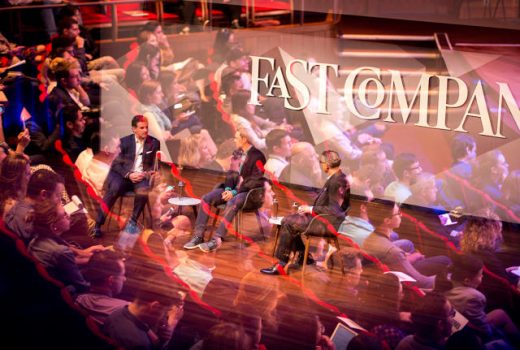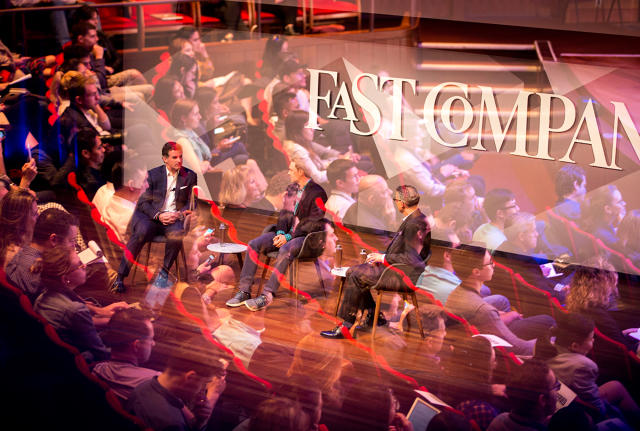Under Armour’s Founder Makes A Passionate Defense Of Big Business
When Kevin Plank launched Under Armour 20 years ago, he never dreamt his sports company would become the phenomenon it is today. “All I was thinking was, “I’m broke today and I need to have money in the bank tomorrow to make payroll and stay in business,” he recalls.
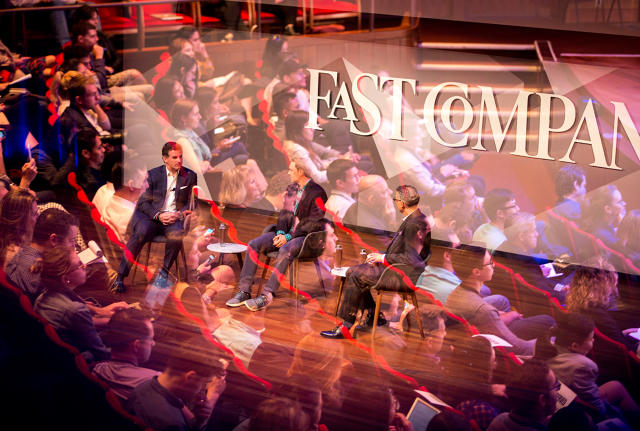
Fast-forward: Under Armour is currently on track to make $5 billion in revenue this year. The business is growing at 25% a year, and now plays in the same league as much older and larger brands like Nike and Adidas. Plank has managed to lure some of the best athletes in the world—including NBA MVP Steph Curry, ballet dancer Misty Copeland, and pro golfer Jordan Spieth—to become brand ambassadors. At the Fast Company Innovation Festival, Plank pondered the growth of his company alongside Spieth, and Fast Company editor Robert Safian.
Under Armour has transitioned from scrappy startup to big business. In the light of the looming election, and vexed conversations about the future of the U.S. economy, Plank makes the case that large, multinational companies like Under Armour are crucial to America’s success. “We’re talking about an election cycle in which there’s a movement towards a populist approach that says that corporate America is not a good thing,” he said. “It’s pretty unfair.”
Plank wants to prove that big global companies, coupled with the right values, can have a positive impact on the United States, contrary to what some groups have argued during this election as they have attacked free trade and big business. He argues that companies can be a force for good, but only if leaders feel a responsibility that goes beyond shareholders. “Besides creating shareholder value, what are we doing to make the world a better place?” he says. “How do we do the right thing?”
For one thing, he says, big companies have the ability to create jobs. Under Armour now employs 15,000 people directly in its 26 global offices, and indirectly hires close to a million people across its supply chain. “There’s upwards of three quarters of a million people making Under Armour stuff at any one time,” he says. “That’s going to grow 50% over the next year, and that means we’re going to be able to affect a million to a million and a half people.”
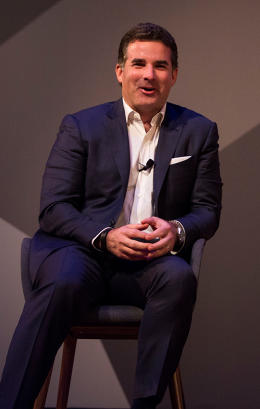
Plank believes that it’s important for American businesses to have an impact on the lives of people around the world. A large part of this chain is overseas: the company’s website says that products are made in Asia, Central and South America, and Mexico. “Each breadwinner in any household supports three to five people,” he says.
But he’s also committed to serving communities here in the U.S. Case in point: The company is headquartered in Baltimore and as the staff base in this location grows from 2,000 to 10,000 in the next few years, Plank wants to redevelop 260 acres of industrial land in the south of the city, as part of an urban rejuvenation project. In addition to creating a new office space, he plans to build new spaces for shops, restaurants, public parks, and 14,000 residential units for the community. “Baltimore is a part of the DNA of our brand,” he says. “It’s the right thing to do for our company.”
For Plank, the role of CEO is wrapped up in the heavyweight of responsibility towards others. “At our company, one of the things I’ve been very vocal about is thinking about our responsibility,” he says.
Besides being responsible for workers around the world and communities here at home, Plank believes in being responsible to the young athletes he brings into the Under Armour fold, including Spieth. At the age of 24, Spieth has already achieved remarkably feats in his sport, including becoming the top ranked golfer in the world and winning the majors in the same year in the PGA Tour. But he has also had challenges: Earlier this year, Spieth choked at the Masters, after leading by five strokes in the final round. Plank has taken it upon himself to connect Spieth with other athletes like Michael Phelps and Tom Brady who have also had dark moments in their careers. “This was about more than just the brand,” Plank says. “These guys just wanted to help and be there for Jordan.”
As he ends the conversation, Plank returns to politics, this time focusing on women’s empowerment. Currently only a third of Under Armour’s businesses focuses on women’s products, but the brand is working hard to change those numbers. Plank hopes that one day soon, it will actually sell more women’s products than men’s. He’s gone some way to getting there by bringing on the ballerina Misty Copeland to become a face of the brand. The many Under Armour ads that featured Copeland demonstrated that dancing was a feat of athleticism on par will any male-dominated game.
As the father of a 9-year-old girl, Plank’s quest to ensure women feel empowered to do anything is very personal. “I want that little girl to know that she can grow up and be the President of the United States if she chooses to be,” Plank says. “I want to be one of those agents of change that continues to make that possible.”
Under Armour founder, CEO, and chairman Kevin Plank with golf pro Jordan Spieth
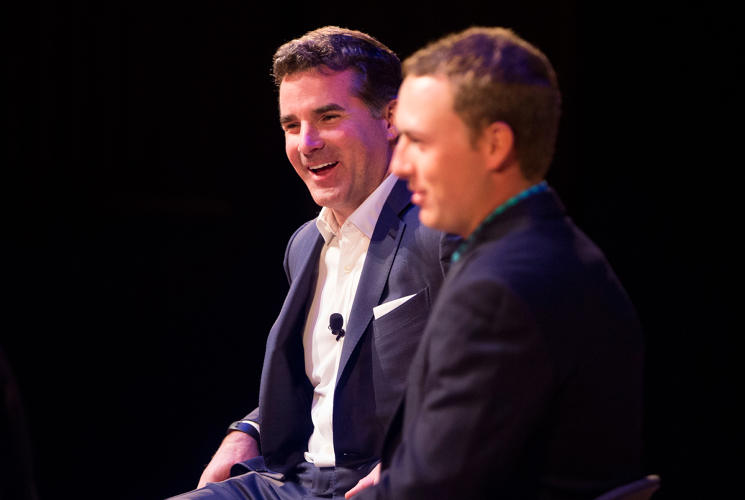
Plank and Spieth onstage with Fast Company editor Bob Safian
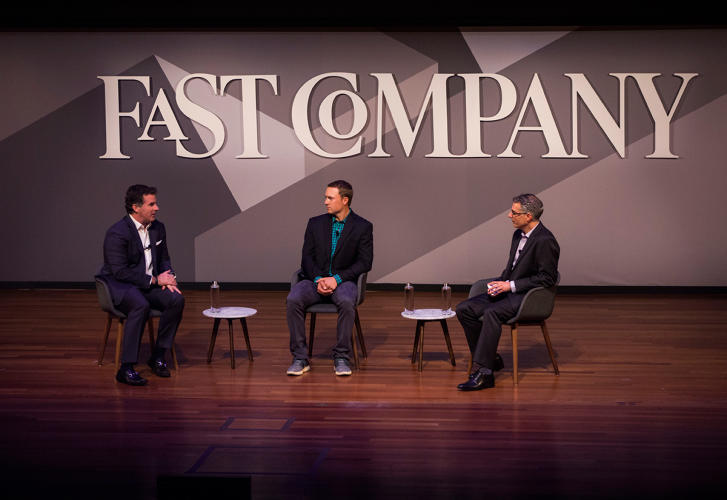
Under Armour was a big part of the 2016 Fast Company Innovation Festival

Plank and Spieth during the Under Armour panel at Fast Company’s 2016 Innovation Festival in New York
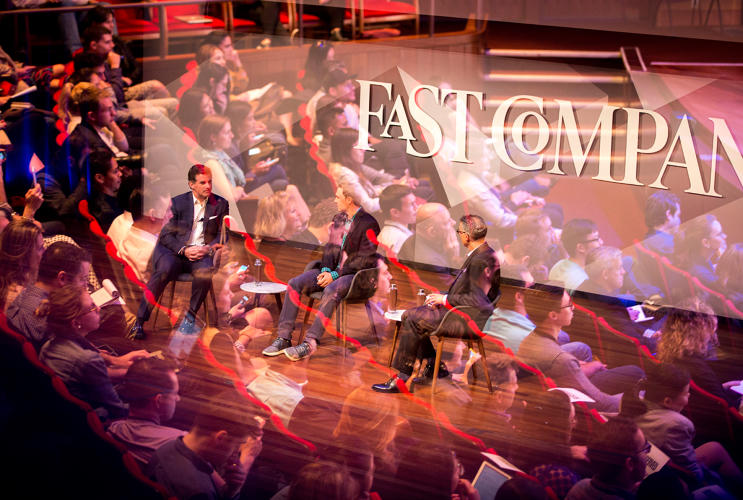
Plank, Spieth, and Safian onstage
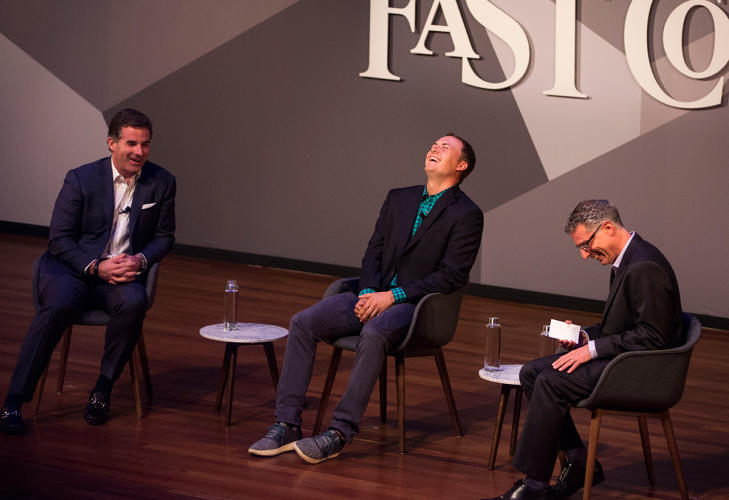
Fast Company , Read Full Story
(10)

